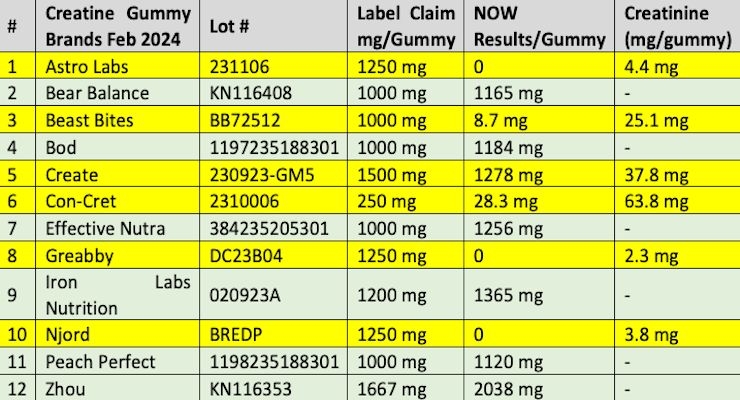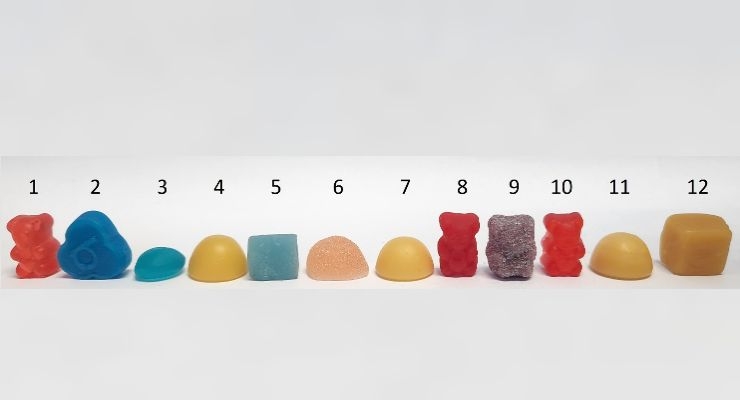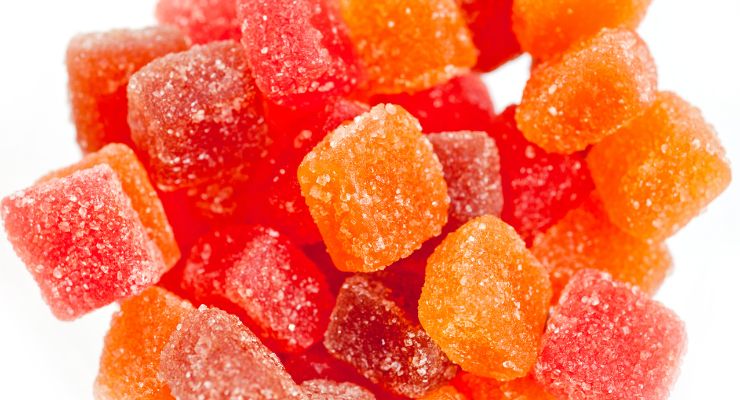02.29.24
In its latest round of product testing, supplement company NOW found widespread failings to meet label claims when testing several creatine gummies it purchased online. This exercise reached a second red flag when, following the testing program’s usual practice of simultaneous testing by a reputable third-party lab, none of the outside labs NOW vetted and approved were capable of testing gummies.
A survey of several brands of creatine was performed to understand the quality available on the marketplace, which included the brands Astro Labs, Bear Balanced, Beast Bites, Bod, Create, Con-Cret, Effective Nutra, Greabby, Iron Labs Nutrition, Njord, Peach Perfect, and Zhou.
Creatine dosages of around 5 grams (5,000 mg) are frequently recommended, and the tested samples claimed that products contained between 750 mg and 5,000 mg per serving, NOW reported. The number of gummies per serving also varied between one and five gummies, and claimed dosages of creatine per gummy ranged from 250 mg to 1,700 mg.
NOW used high-performance liquid chromatography (HPLC) to test creatine content in the gummies, and creatine quantitation was performed using a creatine reference standard of a known concentration.

The brands Bear Balanced (2, as photographed below), Bod (4), Effective Nutra (7), Iron Labs Nutrition (9), Peach Perfect (11), and Zhou (12) all met their label claim. However, Astro Labs (1), Beast Bites (3), Create (5), Con-Cret (6), Greabby (8), and Njord (10) failed to meet the label claim, according to NOW, resulting in a 46% failure rate. The NOW testing team observed that the bear-shaped products (samples 1, 8, and 10) have slightly different colors and potency, but they seem to be made by the same supplier. On the other hand, samples 4, 7, and 11 tested above the label claim and seem to be made by a single supplier.
In response to NOW’s testing, Mark Faulkner, CEO and founder of CON-CRĒT, said the analysis on its Creatine HCl Gummies was “inaccurate.”
“Vireo Systems, the parent company of CON-CRĒT, has established testing protocols and worked with multiple accredited labs while developing CON-CRĒT Creatine HCl Gummies,” Faulkner said. “The company has tested its gummy in at least two trials using an independent, ISO/IEC 17025:2017-accredited laboratory, and the trials demonstrate that the creatine HCl content in the gummy was well above the 250 mg creatine HCl per 4 g label claim. Additionally, CVS Caremark put the Gummies through an extensive testing program to ensure product integrity before accepting them for sale on their retail drug shelves.”

Gummy brands testing below label claim were also tested for creatinine using HPLC. Several creatine gummies were found to contain significant amounts of this unwanted creatine metabolite, while also not meeting their claimed creatine strength. Creatinine is a waste product that naturally builds up in blood when muscles are exercised. Bodies produce creatinine at a constant rate, and kidneys usually eliminate almost all of it. Having very high or low creatinine levels can be a health concern; creatinine supplements are not recommended. Creatine in powder form is stable, but when mixed with water can turn into creatinine. Gummies are not an ideal form for creatine supplements, NOW said, because water is used to make gummies, so it can be difficult to get the correct dosage of creatine.
Astro Labs, Greabby, and Njord had a small amount of creatinine detected, while Beast Bites, Create, and Con-Cret had large amounts of creatinine present, according to NOW tests. Taking the creatine and creatinine data together shows that Astro Labs, Greabby, and Njord likely had a minimal amount of creatine, almost all of which converted to creatinine. Beast Bites and Con-Cret likely had a larger amount of creatine that mostly turned into creatinine, NOW said. Create, which came close to meeting the label claim, had a nearly good amount of creatine that was partially turned into creatinine. However, even combined creatinine and creatine test results failed to add up to creatine claims for this group of products, so these formulations with low creatine test results versus label claims apparently failed to add sufficient creatine.
NOW reported that it apparently has one of a few labs that can test gummies accurately. “We were surprised that none of the third-party labs we typically use, which we consider the best, said they were able to test these gummies,” said NOW Senior Director of Quality Katie Banaszewski. “Given the rapid growth of that delivery system and the regulatory requirement to confirm label compliance, the industry needs to find a solution to this dearth of testing capacity.”
A survey of several brands of creatine was performed to understand the quality available on the marketplace, which included the brands Astro Labs, Bear Balanced, Beast Bites, Bod, Create, Con-Cret, Effective Nutra, Greabby, Iron Labs Nutrition, Njord, Peach Perfect, and Zhou.
Creatine dosages of around 5 grams (5,000 mg) are frequently recommended, and the tested samples claimed that products contained between 750 mg and 5,000 mg per serving, NOW reported. The number of gummies per serving also varied between one and five gummies, and claimed dosages of creatine per gummy ranged from 250 mg to 1,700 mg.
NOW used high-performance liquid chromatography (HPLC) to test creatine content in the gummies, and creatine quantitation was performed using a creatine reference standard of a known concentration.
The brands Bear Balanced (2, as photographed below), Bod (4), Effective Nutra (7), Iron Labs Nutrition (9), Peach Perfect (11), and Zhou (12) all met their label claim. However, Astro Labs (1), Beast Bites (3), Create (5), Con-Cret (6), Greabby (8), and Njord (10) failed to meet the label claim, according to NOW, resulting in a 46% failure rate. The NOW testing team observed that the bear-shaped products (samples 1, 8, and 10) have slightly different colors and potency, but they seem to be made by the same supplier. On the other hand, samples 4, 7, and 11 tested above the label claim and seem to be made by a single supplier.
In response to NOW’s testing, Mark Faulkner, CEO and founder of CON-CRĒT, said the analysis on its Creatine HCl Gummies was “inaccurate.”
“Vireo Systems, the parent company of CON-CRĒT, has established testing protocols and worked with multiple accredited labs while developing CON-CRĒT Creatine HCl Gummies,” Faulkner said. “The company has tested its gummy in at least two trials using an independent, ISO/IEC 17025:2017-accredited laboratory, and the trials demonstrate that the creatine HCl content in the gummy was well above the 250 mg creatine HCl per 4 g label claim. Additionally, CVS Caremark put the Gummies through an extensive testing program to ensure product integrity before accepting them for sale on their retail drug shelves.”
Gummy brands testing below label claim were also tested for creatinine using HPLC. Several creatine gummies were found to contain significant amounts of this unwanted creatine metabolite, while also not meeting their claimed creatine strength. Creatinine is a waste product that naturally builds up in blood when muscles are exercised. Bodies produce creatinine at a constant rate, and kidneys usually eliminate almost all of it. Having very high or low creatinine levels can be a health concern; creatinine supplements are not recommended. Creatine in powder form is stable, but when mixed with water can turn into creatinine. Gummies are not an ideal form for creatine supplements, NOW said, because water is used to make gummies, so it can be difficult to get the correct dosage of creatine.
Astro Labs, Greabby, and Njord had a small amount of creatinine detected, while Beast Bites, Create, and Con-Cret had large amounts of creatinine present, according to NOW tests. Taking the creatine and creatinine data together shows that Astro Labs, Greabby, and Njord likely had a minimal amount of creatine, almost all of which converted to creatinine. Beast Bites and Con-Cret likely had a larger amount of creatine that mostly turned into creatinine, NOW said. Create, which came close to meeting the label claim, had a nearly good amount of creatine that was partially turned into creatinine. However, even combined creatinine and creatine test results failed to add up to creatine claims for this group of products, so these formulations with low creatine test results versus label claims apparently failed to add sufficient creatine.
NOW reported that it apparently has one of a few labs that can test gummies accurately. “We were surprised that none of the third-party labs we typically use, which we consider the best, said they were able to test these gummies,” said NOW Senior Director of Quality Katie Banaszewski. “Given the rapid growth of that delivery system and the regulatory requirement to confirm label compliance, the industry needs to find a solution to this dearth of testing capacity.”




























